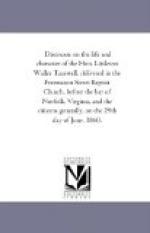When the fatal tidings were known, there arose a piercing shriek of agony and grief, followed presently by the low, touching wail from the stricken heart of the nation. And then, the louder and the longer for the delay, came the cry for vengeance, which burst from the lips of a whole people. The promptness and dispatch with which the British frigate acted indicated deliberate design; and the suspicion instantly flashed across the public mind that the consular authorities of England in our port were privy to its execution. The outbreak in Norfolk was terrible. Had Col. Hamilton, the consul, not been long and intimately known and loved by the people, he would have been taken from his house and gibbeted on the square, as an expiation of the blood of our countrymen, wantonly shed, in a time of peace, by a British captain. An unfortunate British officer, who came up from one of the four frigates in the bay, had well-nigh been torn in pieces by the infuriated people. In such a conjuncture the ordinary forms of government were overlooked, and the citizens in full assembly, the venerable Mathews in the chair, appointed, as in the days of the Revolution, a Committee of Safety. A preamble, setting forth in becoming terms the outrage on the Chesapeake, was adopted, and it was resolved that there should be no intercourse with the British frigates in our waters, or with their agents, until the decision of the federal government was known, under the penalty of being deemed infamous; and the Committee of Safety, consisting of fourteen of our most worthy citizens, some of whose descendants are now within the sound of my voice, were authorized to take such measures as the emergency demanded.[6]
As soon as Commodore Douglas read the resolves of the Norfolk meeting, he addressed an insolent note to the mayor of the borough, in which he declared that if the resolutions were not instantly annulled, he would prohibit every vessel bound in or out of Norfolk from proceeding to her place of destination. This letter was written on board the Bellona frigate, on the third of July. “You are aware,” said this haughty Briton, “that the British flag never has, nor ever will be insulted with impunity.” After some further remarks, he adds: “It therefore rests with the inhabitants of Norfolk either to engage in a war, or remain on terms of peace.” And he closed his letter by saying that he had proceeded with his squadron, which consisted of four fifty-gun frigates, to Hampton Roads, to await the answer of the mayor of Norfolk, which he hoped would be forwarded without delay.
It is in this stage of the proceedings, which he probably regulated from the first, that I shall introduce Mr. Tazewell to your notice. No community was ever placed in a more delicate dilemma. The stoppage of our commerce would produce great inconvenience, and there was no force which the federal government could command at all competent to raise the embargo; and at any moment blood might be shed. The people,




